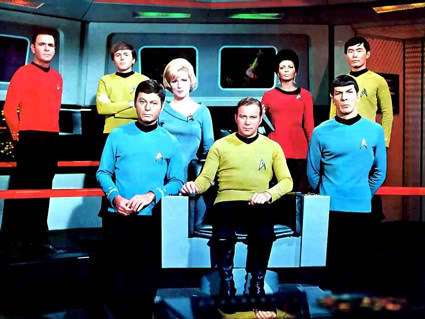I wanted to write about this last week, but busyness and September 11 joined forces to make me write a timelier blog.
Anyway…
September 8 marked the 48th anniversary of Star Trek. I’m a Trekker. (I prefer that term to “Trekkie.”) I’ve loved the Star Trek franchise since I was three years old and watched reruns of the Original Series on a local Fox affiliate with my Dad. I’ve watched almost every episode of all five TV series (ST: The Next Generation, ST: Deep Space Nine, ST: Voyager, ST: Enterprise) and I own all the movies (Star Trek II: The Wrath of Khan is my all-time favorite film). The franchise helped inspire me to become a science fiction writer, so it’s near and dear to me.
I was sad to see Enterprise get cancelled when it finally found its space legs. For several years, I thought the franchise was dead. Then J.J. Abrams revived it with his epic reboot/prequel/remake/whatever. I liked its sequel, Star Trek Into Darkness, even more (despite having a title that would’ve been improved with a well-placed colon).
However, there was always something about Abrams’ version that bugged me. I wasn’t sure what, though. It got many things right: the characters and their dynamics, the adventure, the “personality” of the ships, the optimism, and the music, among other things. It didn’t dawn on me what the issue was until last week. Truthfully, it’s something I think I always knew—and had even heard fans discuss—but it didn’t hit me until then.
They lost Gene Roddenberry’s brain.
Mr. Roddenberry, who died in 1991, created Star Trek as a serious science fiction TV series that addressed mature themes and issues. In other words, it was cerebral science fiction. This was something seen in books and magazines but not on television in that day. It was ahead of its time.
That’s what “Nu Trek” lacks. It’s fun. There’s plenty of space-faring action and adventure with great characters played by wonderful actors, but it isn’t as cerebral. Yes, it plays on themes like friendship and family, but it doesn’t have big sci-fi ideas like the franchise did at its peak. There are no Cold War allegories (the Klingons in TOS), no questions about individuality vs. collectivism (the Borg in TNG), or observations about the effects of religion in people’s lives (the Bajorans and Sisko in DS9). Abrams did exactly what he said he wanted to do: inject some Star Wars into Star Trek (he always preferred the former, hence why he’s directing Episode VII). It wasn’t just in terms of style, though. The story and themes play out more like a Star Wars film.
I’m not saying this is bad. I love Star Wars, but for different reasons. While fans argue which is better, the truth is that they’re apples and oranges. Each is distinct and does what it does well. But with these new films, Trek has veered more in the direction of Wars. I’m not opposed to a new style. Far from it. Any franchise can benefit from a fresh perspective, even from someone who hasn’t been inundated with its lore (Nicholas Meyer wasn’t a fan when he landed the job to direct Wrath of Khan, though he did do his homework). But Abrams’ films aren’t quite Roddenberry’s vision.
Think of it like this: old-school Trek was the class valedictorian while “Nu Trek” is his fun-loving classmate. Sure, he probably gets all B’s in his classes, but he obviously isn’t as smart as the former. Likewise, the valedictorian knows how to have a good time, but he isn’t as much of a party animal.
This is why I’d like to see Trek return to television. It’s easier to tell cerebral stories in a television format. I’m glad Star Trek is fun again, but it needs to have substance, too.
That would please the Great Bird of the Galaxy (Gene’s nickname) and he would bless the franchise even more.
What do you think?


